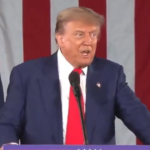CNN senior legal analyst Elie Honig stated on Monday that the trial of former President Donald Trump for his actions on Jan. 6 will not take place before the November election.
The Supreme Court ruled on Monday regarding Donald Trump’s immunity appeal to dismiss special counsel Jack Smith’s case against him. The ruling stated that presidents have immunity from criminal prosecution for “official acts” taken in office. Honig remarked that the trial, where Trump faces four felony counts relating to alleged efforts to overturn the 2020 election, is unlikely to take place in the coming months due to ongoing appeals.
“This case will not go before the election. It will not be tried before the election, and here’s why,” Honig said. “[The] Supreme Court has just said there is such thing as criminal immunity. The test, as we anticipated, essentially, official acts versus unofficial acts. We’re sending it back to the district court. And this is an important detail. The court says several times, whatever the district court finds can be appealed before trial.”
“Jack Smith had made an argument of well, maybe the district judge, the trial judge can work it out and send it to the jury. And then the jury can separate official from unofficial acts,” he continued. “Several times in this opinion, the Supreme Court, the majority, says explicitly: whatever the judge decides about what’s official or unofficial, what’s immune or not immune, that can be appealed back up. 0% chance that happens before November.”
District Court Judge Tanya Chutkan, overseeing the case, previously rejected Trump’s attempt to dismiss the case in December and initially scheduled the trial for March.
WATCH:
‘0% Chance’: CNN’s Elie Honig Torpedoes Dems’ Hopes Trump Trial Will Occur Before Election pic.twitter.com/aHpC3zhCSl
— Daily Caller (@DailyCaller) July 1, 2024
“Under our constitutional structure of separated powers, the nature of Presidential power entitles a former President to absolute immunity from criminal prosecution for actions within his conclusive and preclusive constitutional authority,” the court held in a 6-3 ruling. “And he is entitled to at least presumptive immunity from prosecution for all his official acts. There is no immunity for unofficial acts.”
In the majority opinion, Chief Justice John Roberts wrote that the ultimate analysis of which allegations in Trump’s indictment are considered official acts subject to immunity “is best left to the lower courts.”
“Certain allegations—such as those involving Trump’s discussions with the Acting Attorney General—are readily categorized in light of the nature of the President’s official relationship to the office held by that individual,” Roberts wrote. “Other allegations—such as those involving Trump’s interactions with the Vice President, state officials, and certain private parties, and his comments to the general public present more difficult questions. ”












